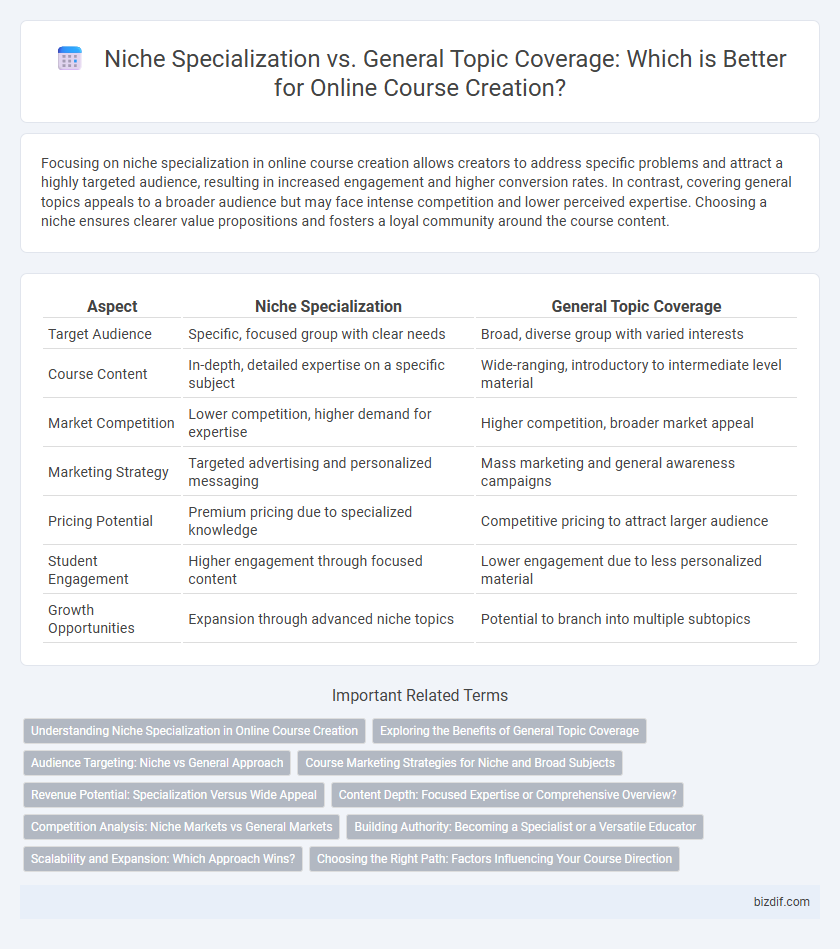Focusing on niche specialization in online course creation allows creators to address specific problems and attract a highly targeted audience, resulting in increased engagement and higher conversion rates. In contrast, covering general topics appeals to a broader audience but may face intense competition and lower perceived expertise. Choosing a niche ensures clearer value propositions and fosters a loyal community around the course content.
Table of Comparison
| Aspect | Niche Specialization | General Topic Coverage |
|---|---|---|
| Target Audience | Specific, focused group with clear needs | Broad, diverse group with varied interests |
| Course Content | In-depth, detailed expertise on a specific subject | Wide-ranging, introductory to intermediate level material |
| Market Competition | Lower competition, higher demand for expertise | Higher competition, broader market appeal |
| Marketing Strategy | Targeted advertising and personalized messaging | Mass marketing and general awareness campaigns |
| Pricing Potential | Premium pricing due to specialized knowledge | Competitive pricing to attract larger audience |
| Student Engagement | Higher engagement through focused content | Lower engagement due to less personalized material |
| Growth Opportunities | Expansion through advanced niche topics | Potential to branch into multiple subtopics |
Understanding Niche Specialization in Online Course Creation
Niche specialization in online course creation targets a specific audience with tailored content, leading to higher engagement and better learner outcomes. Focusing on a narrow, well-defined topic allows instructors to position themselves as experts and attract dedicated students seeking in-depth knowledge. Course creators benefit from reduced competition and increased market demand by addressing precise skills or problems within a particular industry or interest area.
Exploring the Benefits of General Topic Coverage
General topic coverage in online course creation attracts a wider audience by addressing diverse interests and learning needs, increasing enrollment potential. It encourages interdisciplinary learning and fosters a broad skill set applicable to various industries, enhancing course value and student engagement. Expanding course content across multiple subjects also supports continuous learner development and adaptability in rapidly changing job markets.
Audience Targeting: Niche vs General Approach
Targeting a niche audience allows course creators to address specific learner needs, increasing relevance and engagement through specialized content that resonates deeply. Broad topic coverage appeals to a wider demographic but often sacrifices depth, making it harder to establish authority or loyalty within any single group. Effective audience targeting in online course creation hinges on balancing niche specialization with broader appeal to optimize enrollment and learner satisfaction.
Course Marketing Strategies for Niche and Broad Subjects
Targeting a niche specialization allows course creators to appeal to a specific audience with tailored content, enhancing engagement and conversion rates through precise marketing tactics such as targeted ads and community building. Broad subject coverage demands diverse marketing strategies, including leveraging SEO for multiple keywords and extensive social media campaigns to attract a wider, less defined audience. Effective course marketing hinges on understanding the unique needs of niche learners versus broad audience segments, optimizing messaging, and channel selection accordingly.
Revenue Potential: Specialization Versus Wide Appeal
Niche specialization in online course creation often yields higher revenue potential by attracting a targeted audience willing to pay premium prices for expert knowledge. Courses centered on specialized topics benefit from less competition and stronger community engagement, driving sustained sales. Conversely, broader general topic coverage appeals to a wider audience but may face saturation, resulting in lower average course prices and reduced per-student revenue.
Content Depth: Focused Expertise or Comprehensive Overview?
Niche specialization in online course creation offers deeper content depth by targeting a specific audience with expert-level insights, enhancing learner engagement and mastery. General topic coverage provides a comprehensive overview that attracts a broader audience but may sacrifice detailed expertise and advanced skill development. Choosing between focused expertise or broad coverage depends on the course goals, market demand, and learner needs for either specialized knowledge or introductory understanding.
Competition Analysis: Niche Markets vs General Markets
Analyzing competition reveals that niche markets in online course creation often face fewer competitors, allowing creators to target specific audiences with specialized content that addresses unique needs. General topic coverage attracts broader audiences but encounters intense competition from numerous established courses, requiring strong differentiation and marketing strategies. Selecting a niche can lead to higher engagement and conversion rates, while general topics demand continuous innovation to maintain visibility in saturated markets.
Building Authority: Becoming a Specialist or a Versatile Educator
Specializing in a niche allows online course creators to build strong authority by targeting a specific audience with in-depth expertise, leading to higher trust and engagement. Covering general topics offers versatility and attracts a broader audience but may dilute perceived expertise, making it harder to establish a distinctive brand. Successful online educators balance niche specialization with strategic expansion to maintain authority while appealing to diverse learner needs.
Scalability and Expansion: Which Approach Wins?
Niche specialization in online course creation drives higher scalability by targeting specific audience needs, enabling focused marketing and deeper expertise development. General topic coverage offers broader appeal but often dilutes course depth, limiting expansion potential and learner retention. Scalability and sustainable growth favor niche-focused courses that build loyal communities and command premium pricing.
Choosing the Right Path: Factors Influencing Your Course Direction
Selecting a niche specialization allows course creators to target specific audiences seeking expert knowledge, increasing engagement and conversion rates. General topic coverage appeals to broader demographics but may face higher competition and lower perceived authority. Key factors influencing this decision include audience demand, competitive analysis, personal expertise, and long-term scalability of the course content.
Niche specialization vs General topic coverage Infographic

 bizdif.com
bizdif.com